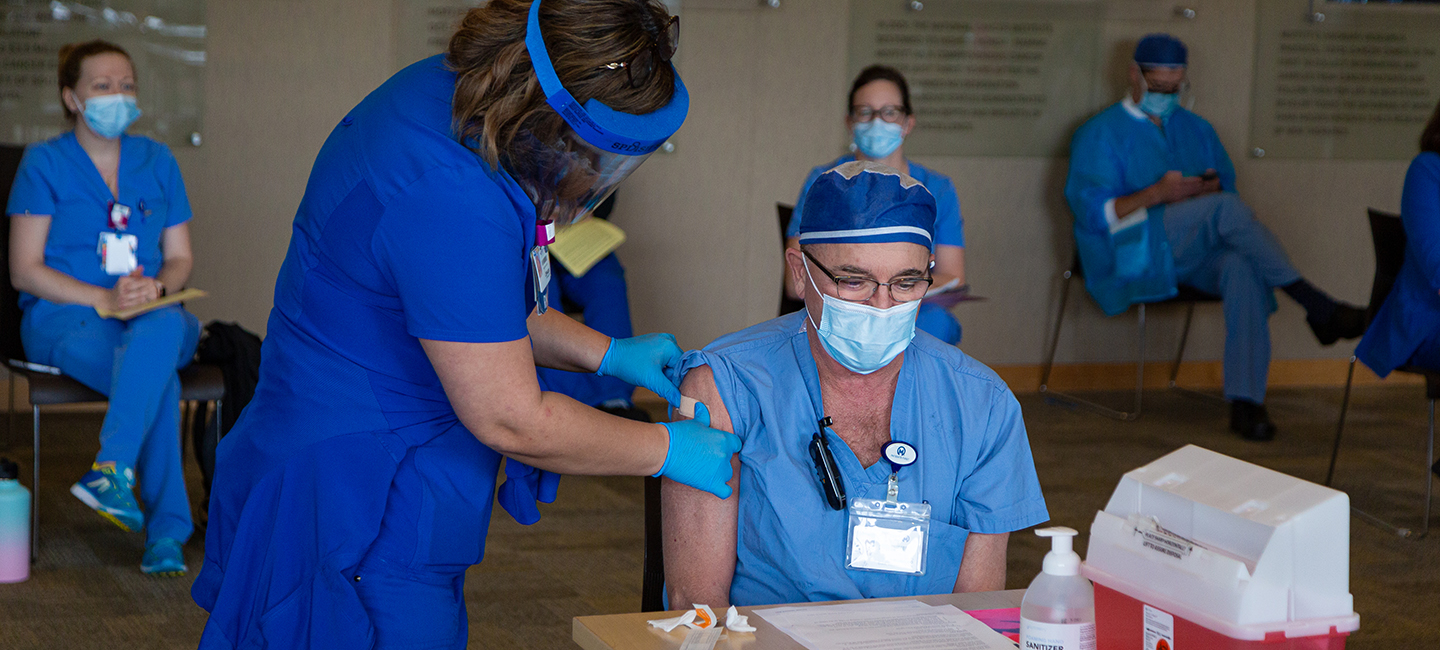9 Things You Need to Know About the COVID-19 Vaccine
As shipments COVID-19 vaccines arrive nationwide, health care workers are among the first to receive the vaccine. Around 600 frontline team members at Moffitt Cancer Center have already been vaccinated.
Even though some have already received the vaccine, you probably still have a lot of questions about the COVID-19 vaccine.
Here’s a list of questions to help you better understand how the vaccine works and what you can expect.
How does the COVID-19 vaccine work?
Both Pfizer and Moderna vaccines use a messenger RNA, or mRNA, a new technology in vaccine development. Instead of using the virus, RNA vaccines use pieces of genetic material to coax the body into developing defenses against future infection.
How safe is the COVID-19 vaccine?
The U.S. vaccine safety system ensures that all vaccines are as safe as possible. The detailed data indicates Pfizer's vaccine is a highly effective and safe vaccine, based on a clinical trial of more than 40,000 diverse participants. Moderna’s clinical trial included 30,000 participants. Data suggests both vaccines are about 95% effective at protecting people from developing COVID-19, and neither has shown serious side effects.
What are the reported side effects of the vaccine?
Side effects from the mRNA vaccines are reported to be short lived and happen within the first few days of receiving the vaccine. Side effects most commonly reported include:
- Soreness/redness at injection site most common
- Fatigue, headache, joint pain, and fever or “flu-like” symptoms
Side effect occurrence is typically higher after the second dose of vaccine. To monitor for immediate side effects, persons receiving the vaccine should be observed for 15 minutes after vaccination.
Because trials have not been going on long enough, there is no evidence that the vaccine causes any long-term side effects at this time.
Should cancer patients receive the COVID-19 vaccine?
The COVID-19 vaccine clinical trials have not yet included cancer patients, so it’s too soon to know if or how well the vaccine might work for them. Moffitt experts believe cancer patients can safely get the vaccine because it does not use a live virus. However, for some patients in active treatment that causes immunosuppression, the vaccine may not be effective.
Over the coming months, clinical trials will continue to expand to determine the safety and efficacy of the COVID-19 vaccine for cancer patients. If you are in active treatment, you should speak to your provider before getting the vaccine.
It is also important not to delay any treatment for cancer in order to receive the COVID-19 vaccine.
If you are a cancer survivor, it should be safe for you to receive the vaccine. If you have any concerns, you should talk to your oncologist or primary care physician.
When will the COVID-19 vaccine be available for cancer patients?
Even though cancer patients are in one of the top priority groups for vaccination, there is no set timeline for when vaccines will be available to them. Health care organizations are planning on receiving additional shipments in the near future, and hope to be able to distribute the vaccines to cancer patients in the new few months.
Could I have an allergic reaction to the vaccine?
While a small number of people have had an allergic reaction to the vaccine, it is very rare. If you have had a severe allergic reaction to other vaccines or if you carry an EpiPen®, you should talk to your doctor before getting the COVID-19 vaccine.
How effective is the COVID-19 vaccine?
Both the Pfzier and Moderna COVID-19 vaccines are shown to be approximately 95% effective.
When can I expect immunity after receiving the COVID-19 vaccine?
Projected immunity after the two-dose series is within two weeks after the second dose.
Should I get the vaccine if I have already been diagnosed with COVID-19 illness in the past?
It is currently unknown how long natural immunity lasts after recovering from COVID-19. Early studies show that it is not long lasting, and cases of reinfection have been reported.
According to the Advisory Committee on Immunization Practices, those who have been diagnosed with COVID-19 should receive the COVID-19 vaccine as long as they wait at least 90 days since the start of symptoms or a positive COVID-19 test.



